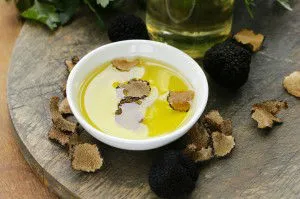Truffles are among the most rare, expensive, and all around gourmet foods on the planet. These aromatic underground mushrooms, which hail from France and Italy, have an unequalled flavor and scent, and are often simply shaved on top of upscale dishes to complete them.
Mushrooms have a wide variety of, including the provision of antioxidants, B-vitamins, magnesium, potassium and fiber, and truffles are no exception. The notable difference with truffles is that their scent mimics mammalian pheromones, making eating them a truly unique experience.
As quality truffles sell for hundreds of dollars an ounce, and are hard to get in this part of the world, many foodies top their meals off with a dash of truffle oil, in an attempt to imbibe that gourmet truffle essence. However, the unfortunate reality is that truffle oil is a distant cry from real truffles – and many do not even contain a single trace of truffle at all.
What they do contain is a variety of chemicals. That truffle oil that you are using to flavor that roasted veggie medley is actually a mix of several imposter chemicals with clever marketing. One common chemical ingredient in many different truffle oils and butters is 2,4-Dithiapentane, also known as formaldehyde dimethyl mercaptal. This compound may be hiding under label names such as “truffle flavor” or “truffle essence,” but is actually a product of petroleum.
The Material Safety Data Sheet on 2,4-Dithiapentane has many cautions and warnings. This compound is listed as a flammable, as well as being a severe eye, lung and skin irritant. If ingested, this chemical “may cause CNS [central nervous system] depression,” and if it is inhaled, it can lead to delayed pulmonary edema. Of course, this is in large doses, but taking smaller doses of a poison poses risks.
It is this chemical that makes up the flavor portion of many truffle oils. Other chemical compounds, including preservatives and colorings, are often used as well. Some oils have bits of dried truffle inside, but you can bet they offer very little to no effect on the oil, which is still chemically flavored. Additionally, truffle products are not closely watched by the FDA, so even more dangerous imposters may enter your bottle.

Instead of drizzling a truffle imposter on your culinary creations, why not a bit of organic, extra-virgin coconut oil, warmed slightly to a rich, liquid state? This incredible oil will offer your body a world of benefits, and can elevate anything from a grilled cheese sandwich to a sophisticated salad instantly.
-The Alternative Daily
Sources:
http://www.huffingtonpost.com/2014/10/31/eataly-joe-bastianich-truffle-oil_n_6084560.html
http://blogs.houstonpress.com/eating/2012/09/truffle_oil_chemical_why_bad.php
http://www.chemspider.com/Chemical-Structure.14639.html
http://www.chemblink.com/MSDS/MSDSFiles/1618-26-4_Fisher%20Scientific.pdf
http://www.nytimes.com/2012/12/26/dining/truffles-a-buried-treasure-filled-with-mystery.html?pagewanted=all&_r=0
